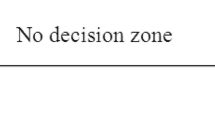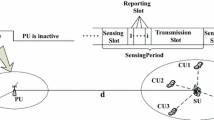Abstract
In cognitive radio networks, cooperation can greatly improve the performance of spectrum sensing. This paper proposes a delay (QoS) quality-of-service guaranteed cooperative spectrum sensing frame structure in which secondary users (SUs) conduct spectrum sensing and data transmission concurrently over two different parts of the primary user spectrum band. A double-threshold sensing scheme is employed in the local sensing step, only the SUs with reliable sensing information are allowed to transmit their “one bit” local decisions to the fusion center. The sensing performance and the SU transmission delay are analyzed in detail in this paper. Computer simulations show that the delay QoS guaranteed cooperative double-threshold sensing scheme could not only decrease the SU transmission delay but also save the reporting overhead of the SUs compared with the conventional detection method with one threshold.






Similar content being viewed by others
References
McHenry, M. A. (2005 August). NSF spectrum occupancy measurements project summary. Shared spectrum company report.
Haykin, S. (2005). Cognitive radio: brain-empowered wireless communications. IEEE Journal on Selected Areas in Communications, 23(2), 201–220.
Alshamrani, A., Shen, X., & Xie, L.-L. (2011). QoS provisioning for heterogeneous services in cooperative cognitive radio networks. IEEE Journal on Selected Areas in Communications, 29(4), 819–830.
Yücek, T., & Arslan, H. (2009). A survey of spectrum sensing algorithms for cognitive radio applications. IEEE Communications Surveys & Tutorials, 11(1), 116–130.
Stotas, S., & Nallanathan, A. (2012). On the throughput and spectrum sensing enhancement of opportunistic spectrum access cognitive radio networks. IEEE Transactions on Wireless Communications, 11(1), 97–107.
Vu-Van, H., & Koo, I. (2011). Cooperative spectrum sensing with collaborative users using individual sensing credibility for cognitive radio network. IEEE Transactions on Consumer Electronics, 57(2), 320–326.
Ghasemi, A., & Sousa, E. S. (2007). Opportunistic spectrum access in fading channels through collaborative sensing. Journal of Communications, 2(2), 71–82.
Ghasemi, A., & Sousa, E. S. (2007). Asymptotic performance of collaborative spectrum sensing under correlated log-normal shadowing. IEEE Communications Letters, 11(1), 34–36.
Zhang, W., Mallik, Ranjan K., & Letaief, K. B. (2009). Optimization of cooperative spectrum sensing with energy detection in cognitive radio networks. IEEE Transactions on Wireless Communications, 8(12), 5761–5766.
Yin, W., Ren, P., Du, Q., & Wang, Y. (2012). Delay and throughput oriented continuous spectrum sensing schemes in cognitive radio networks. IEEE Transactions on Wireless Communications, 11(6), 2148–2159.
Liang, Y. C., Zeng, Y., Peh, Edward, C. Y., & Hoang, A. T. (2008). Sensing-throughput tradeoff for cognitive radio networks. IEEE Transactions on Wireless Communications, 7(4), 1326–1337.
Acknowledgments
This work This work is supported by the National Fundament Research of China (973 No. 2009CB3020400), Jiangsu Province Natural Science Foundation under Grant BK2011002, National Natural Science Foundation of China (No. 61072044).
Author information
Authors and Affiliations
Corresponding author
Rights and permissions
About this article
Cite this article
Hu, H., Zhang, H. & Yu, H. Delay QoS Guaranteed Cooperative Double-Threshold Sensing Scheme in Cognitive Radio Networks. Wireless Pers Commun 77, 3209–3221 (2014). https://doi.org/10.1007/s11277-014-1705-3
Published:
Issue Date:
DOI: https://doi.org/10.1007/s11277-014-1705-3




